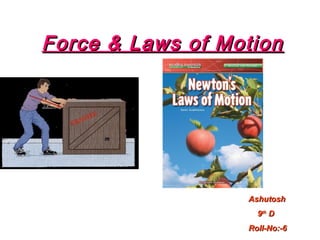FORCE AND LAWS OF MOTION
- 1. Force & Laws of Motion Ashutosh 9th D Roll-No:-6
- 2. What is Force? A push or pull acting on the body is known as force
- 3. Two types of force âĒ Balanced Force âĒ Unbalanced Force
- 4. Balanced Force When two forces of equal magnitude but acting in opposite directions on an object simultaneously,then the object continues in its state of rest or of uniform motion in a straight line.such forces acting on the object are known as Balanced Force.
- 5. Unbalanced Force When two forces of unequal magnitudes act in opposite directions on an object simultaneously,then the object in the direction of large force.These forces acting on the object are known as Unbalanced Force.
- 6. Laws of motion There are three laws of motion:1.First law of motion 2.Second law of motion 3.Third law of motion
- 7. First law of motion According to this law everybody continues in its state of rest or uniform motion in a straight line unless compelled by some external force (i.e.unbalanced force) to change that state.
- 8. Second law of motion According to this law,the change in momentum of a body per unit time is directly proportional to the unbalanced force acting on the body and the change in momentum takes place in the direction of unbalanced force on the body.
- 9. Third law of motion Action and reaction are equal and opposite.
- 10. Inertia The tendency of a body to oppose or resist any change in its state of rest or uniform motion is called inertia of the body . There are three types of Inertia:1.Inertia of Rest 2. Inertia of Motion 3. Inertia of Direction
- 11. Inertia of Rest The tendency of a body to oppose any change in its state of rest is known as inertia of rest. Example:-When a tree is viourously shakensome of the leaves fall from the trees. When a tree is vigorously shaken,the branches of the tree come in Motion but the leaves tend to continue in their state of rest due to inerria of rest.As aresult of this leaves get separated from the branches of the tree and hence fall down
- 12. Inertia of Motion The tendency of a body to oppose any change in its state of uniform motion is known as inertia of Motion. Example:-The passengers fall forward when a fast moving bus stops suddenly. This is because,the lower part of the bodies of the passengers come to rest as soon as the bus stops.But the upper part of their bodies continue to move forward due to inertia of motion.
- 13. Inertia of Direction The tendency of a body to oppose any change in its direction of motion is known as inertia of direction. Example:-When a fast moving bus negotiate a curve on the road, passengaers fall towards the centre of the curved road. This is due to the tendency of the passengers to continue to move in a straight line.
- 14. Momentum Momentum is nothing but product of mass and velocity. Momentum of fast running man is more than that of running slow.














